Weeks after her shocking detention, Rümeysa Öztürk awaits justice, while Ankara says the Turkish student’s case is being closely followed.
The Foreign Ministry on Sunday said that the case of the Turkish Ph.D. detained in the United States last month after writing a pro-Palestinian article for a student publication was being monitored. The ministry was responding to a statement from main opposition leader Özgür Özel, who questioned what Türkiye has done for the 30-year-old woman so far.
Öztürk was one of four students who wrote an op-ed in The Tufts Daily at Tufts University, criticizing the school’s response to student activists demanding that the school “acknowledge the Palestinian genocide,” disclose investments and divest from companies with ties to Israel. She was apprehended by masked immigration officials on March 25 in a Boston, Massachusetts, suburb and subsequently driven to Vermont before being put on a plane and sent to a detention center in the state of Louisiana. She also had her student visa revoked after being arrested.
The ministry said in a statement that Öztürk’s case has been under close watch since the beginning and described her as a “symbolic figure” in an ongoing legal process that has emerged from developments in U.S. domestic politics that affect thousands of international students. It said the proceedings are being carried out in line with the preferences of Öztürk and her family, and with respect for her rights.
Öztürk has received consular support from the start, the statement added. The consul general in Houston visited her several times in Louisiana, while the Boston consul general held an online meeting with her.
“Contrary to politically motivated and misleading claims, there are two separate legal proceedings concerning Ms. Öztürk,” the Foreign Ministry said.
The first is an immigration case in Louisiana. At an April 16 hearing that was attended by officials from the Houston Consulate, a court reviewed the legal basis of the U.S. decision to revoke her visa. A ruling is expected May 1. The court rejected a request for her release on bail ahead of the decision. The second case concerns her objection to the detention. A Vermont court, which held a hearing April 14, ruled on April 18 that it has jurisdiction and ordered Öztürk’s transfer to the state by May 1. Her bail request in that case is scheduled for review on May 9. The ministry said it will continue to monitor both processes closely and provide all support.
Öztürk is one of several foreign students attending American universities who have been detained by immigration officials and had their visas revoked because of their pro-Palestinian support and demonstrations on campus.
Hunger strike
Cases of students expelled, detained or in the process of deportation led to protests, while a Boston University professor took it one step further. Physiological ecologist Nathan Phillips launched a hunger strike when the university administration took down a “Free Rümeysa” sign he had hung at his office window. His strike is also in solidarity with Mahmoud Khalil and Mohsen Mahdawi, student activists who were detained over their activism in support of Palestinians facing Israeli oppression.

Phillips, who launched the hunger strike earlier this week after the university repeatedly removed the signs in support of detained students, is on a strict liquid diet now as he juggles his activism with his day-to-day teaching. Speaking to Anadolu Agency (AA) on Sunday, Phillips said he was told that removal of “political” signs was part of the school’s policy.
He stated that he was horrified when he found out about Öztürk’s “abduction-like” detention. “I never thought that someone who exercised her freedom of expression by penning an article in a school newspaper would be (detained) unconstitutionally and disappear,” he said.
Phillips says Öztürk’s detention is a violation of the First and Fifth Amendments on freedom of speech and protection of individuals against self-incrimination, respectively.
“The attack on Rümeysa’s freedom of speech and expression is an attack on my rights too,” he stated. Phillips said his action in general was against attempts across the United States to suppress those rights.
Phillips also criticized what he called the weaponization of anti-Semitism to suppress views critical of Israel and pro-Palestine views.
“Criticizing (Israeli Prime Minister) Benjamin Netanyahu, who pursues a policy of war and massacre without discrimination in Gaza, is not anti-Semitism,” he underlined. He said it was heart-wrenching to see foreign students have their visas revoked without any excuse, adding that many students faced the practice in his own university as well. He expressed concerns about the prevalent climate of fear at U.S. universities.
“I will keep this sign of ‘Free Rumeysa’ for a day where I can freely hang it on my window,” he said, vowing to continue his hunger strike until the release of Öztürk, Khalil and Mahdawi.








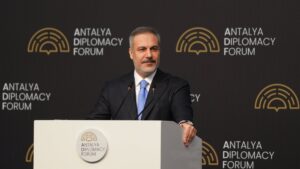





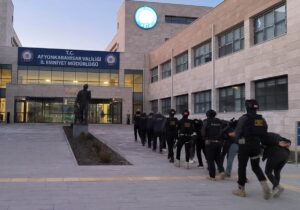

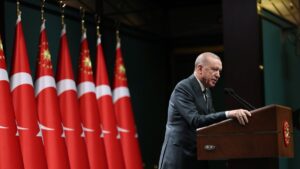

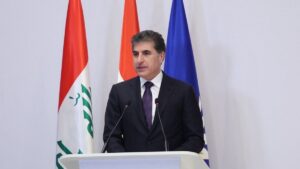

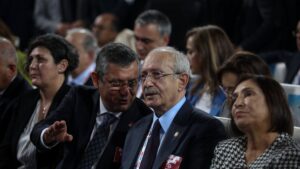




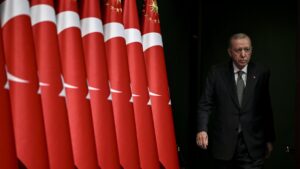

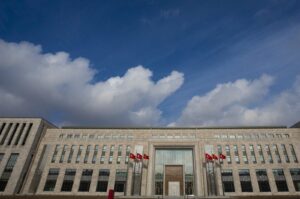





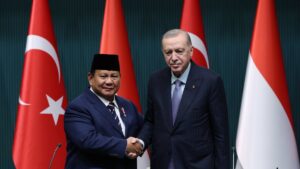





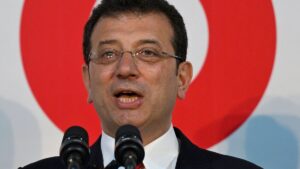

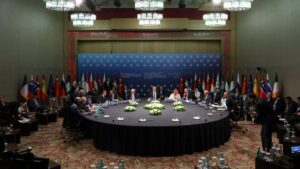










Be First to Comment